As one of the last PSP games likely to ever get a physical copy in the US, Class of Heroes 2's pending release already has a good amount of history behind it. In addition, there's Gaijinworks' past attempt at a Kickstarter for a deluxe release(which sadly was a miserable failure), the lukewarm reception to Atlus' release of the original game, and this being the first RPG localization coming from Working Designs' Victor Ireland since Growlanser Generations in 2004.
Victor Ireland has gone to great lengths to defend the release of CoH2 on what many would call a dead system. He rightfully believes the PSP has still many great RPGs worth releasing in the US, as there's no shortage of great titles in Japan that have never been even considered for localization, with more still being announced on a regular basis(even if the latter mostly consist of Otome visual novels, thanks to Idea Factory).
Although I have yet to play the original game, I've heard quite a bit of negativity. All the dungeons are randomized and claustrophobic labyrinths with little variety or room for stable exploration. The developers, a team from Acquire called ZeroDiv, are also responsible for the PS3 'Wizardry Renaissance' titles, and the similarities are all over the place.
Although CoH uses (arguably inferior) cute anime styled-designs instead of Wizardry's realistic-proportioned fantasy artwork, the gameplay is largely the same as its console big-brother.
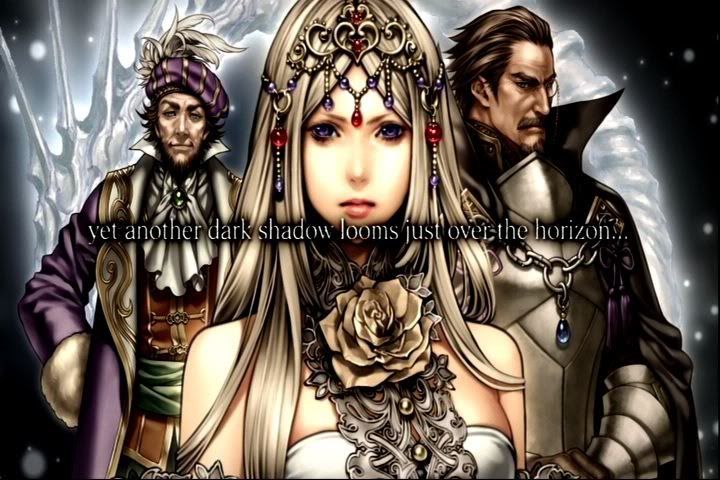 |
| Wizardry: Labyrinth of Lost Souls (PSN) |
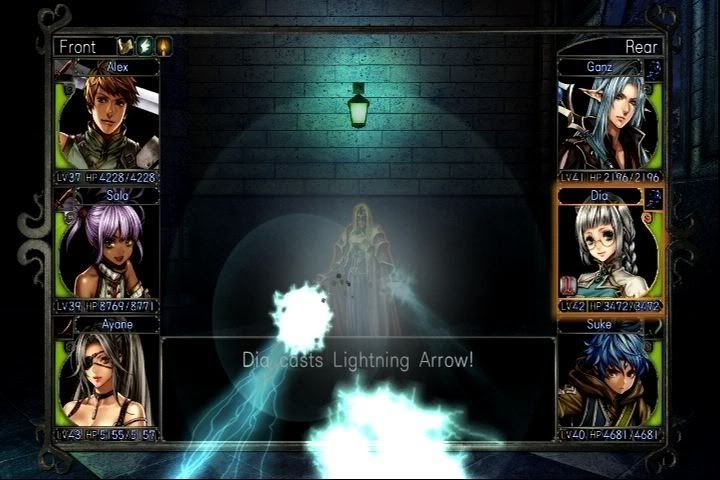 |
| See the similarities? |
From the main hub, or school in CoH's case, you create your party from scratch using a wide variety of races and classes, mostly Wizardry standards, all: elves, humans, dwarfs, dragons, even angels and demons. The player is given free reign in making any sort of party they like, though more often than not, all they'll need is the traditional line-up of a priest, wizard, thief, and a front line of tank warriors.
This isn't quite as viable in Class of Heroes, at least not its sequel, as priests and wizards are technically one-and-the same. In Wizardry, you can always make separate priests and wizards, or just respec one as the other later on to get both. Whichever learns healing or offensive magic never naturally learns the other.
My CoH2 Mage knows both healing and offensive magic, and while not a master of either, is very serviceable at each field. One huge departure from the Acquire Wizardry titles: CoH2 does not use the traditional 9/9/9 magic system, where each spell has its own stock of costs(think FF8). Instead, you get traditional MP and a normal list of spells.
My team currently consists of a dual-wielding Samurai(something of a spellsword), a tank Warrior, a two-fisted monk, a bow-wielding ranger(also doubles as a trap-disarming thief, and hilariously is more powerful than anyone in my front line), a Mage(whose spells are ridiculously over-powered), and the support-class known as the Idol, who despite being cute as a button, has proven largely useless so far. It would be great if the Idol could take some of the support magic burden away from my Mage, as those healing and mapping skills would actually give her something to do other than cast negligible stat-boosting magic and flail at slimes with a microphone.
Right off the bat, CoH2's dungeons are anything but claustrophobic. You start out in a big open-air forest called the 'Beginner's Brush', full of winding paths lined with trees, bushes, and even areas full of water that require floating magic to get across.
This may inspire comparisons to Atlus' Etrian Odyssey series, but the similarities stop there. While Etrian Odyssey's forests feel vivid and alive, thanks in no small part to Yuzo Koshiro's beautiful atmospheric music, the forests(and dungeons in general) within CoH2 feel dead.
That's because they have no music: none. Much like the Acquire Wizardry games, these dungeon crawlers favor atmosphere over ambient BGM. This worked fairly well in the PSN Wizardry, with eerie footsteps and moans making each block of progress a creepy undertaking.
With the cute and colorful style favored by CoH2, it makes what should be a cheerful adventure seem foreboding and barren. There is a nice ambient piece that plays when you examine chests or peruse the menus, and some appropriately intense battle music, but whenever moving through the dungeons, expect nothing but silent tedium, and you'll be moving through them a lot. Class of Heroes 2's dungeons are not just numerous, they are massive.
Etrian Odyssey's team seemed to understand something very important to a dungeon crawler: if a player's going to delve into dungeons for hours on end, they may as well have something enjoyable to listen to. Even Starfish's much smaller, and very prolific, Elminage series was blessed with solid ambient dungeon BGM. Class of Heroes is already going on to its fifth title in the series, and one can only hope they've taken notes from their competitors by now.
 |
| Elminage Original (PSP) |
Starfish's Elminage series, regrettably, has been largely left unlocalized, and only the original has been released on the PSP by UFO Interactive, with a buggy and uneven localization considered rushed at best. Not even a patch was able to fix all the game's numerous errors, and those are almost unheard of for PSP titles.
Class of Heroes 2 has little to make it stand apart from the many other dungeon crawlers on the market nowadays, strictly going off the gameplay. It has charming art and a wide variety of dungeons and parties to explore, but it's an unpolished assortment.
This is where Victor Ireland's involvement should come as a relief. Working Designs has always specialized at making unremarkable stories and plots shine through clever writing, and this game is no exception. The NPC and quest dialogue is all witty, well-written, and worth savoring. Even incidental combat lines have a trademark Working Designs sense of humor to them, such as lines declaring that slain ghost monsters shall 'spook no more', and bow-wielding archers' attacks leave their victims 'full of holes'.
The core plot of CoH2 is certainly slow to build, at least as far as I've gotten. The characters are charming and the setting is fun, but those expecting a plot to grip you from the start like Growlanser II or the Lunar titles should dial back their hopes. Of course, this is a dungeon crawler, so most players of the genre seldom expect an engrossing story, but there have been instances where they have succeeded brilliantly at it, such as Atlus' narrative-rich Wizardry: Tale of the Forsaken Land and even the minimalist storytelling of the original Etrian Odyssey.
 |
| Wizardry: Tale of the Forsaken Land (PS2) |
This is hardly a deal breaker. The quests are varied and have fun plots, and the core story is more than enough to keep the player going through the dungeons, but when the journey is left as barren as Acquire's is due to the lack of ambient music, it feels as if the sharp writing is the best aspect of an otherwise flawed journey.
I'm still playing Class of Heroes 2, and I'm enjoying mapping out the massive dungeons and the fun battle system, but still, part of me wishes I was playing Atlus or even Starfish's more polished takes on the genre.
On the bright side, Victor promises the later games in the series improve further on the formula Acquire is content to reuse time and time again, so as said earlier, let's hope they've been doing a lot of studying.
 |
| Sfoglia gonna cut somebody! |

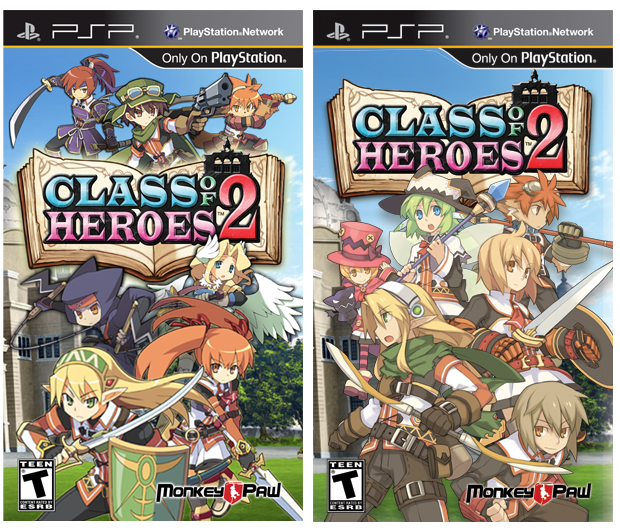
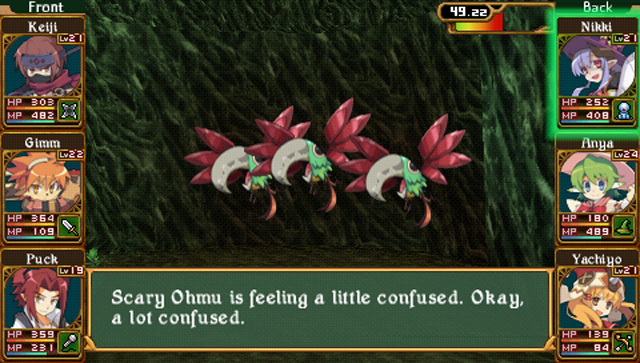

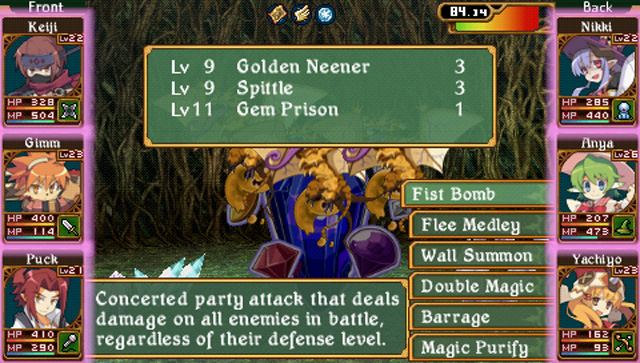
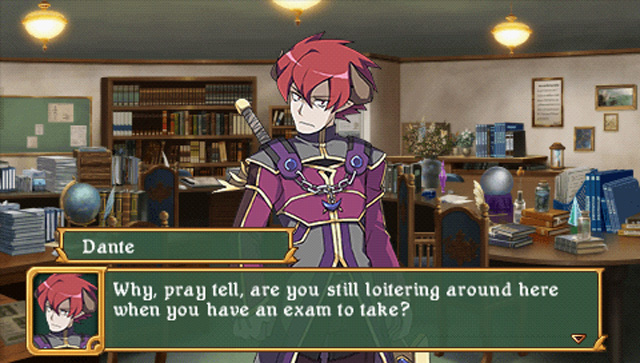
Sounds pretty good. Just to support Gaijinworks, I'm gonna buy it in the future on my Vita. And to be honest, the only WD game I have is Alundra, which I am happily going through(despite problems with platforming and living in Zelda's shadow).
ReplyDelete